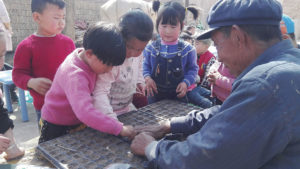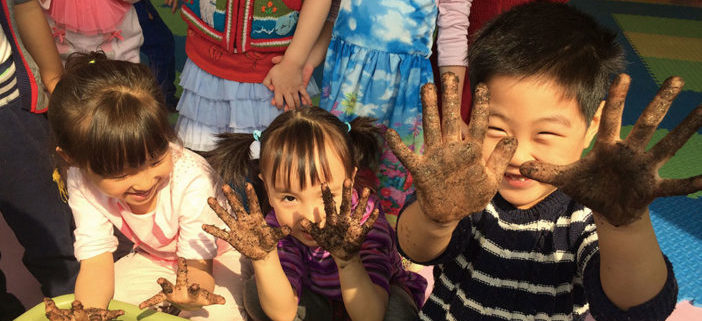Back in 2009, a pop phenomenon drove millions of people worldwide to grow plants — but on cyberspace. That’s FarmVille, a social networking game on Facebook. Its concept made Facebook users plant crops, raise cattle, and become farmers themselves without a sweat.
Try searching for “farm” on your app store and a wealth of farming simulation apps will surface. Most of them look animated and cartoonish, probably designed in such a way to make kids download and play these apps. Play time? Check. Teaching kids the difference between plants and farm animals? Maybe check. Making them active? Definitely not.

Natural interaction.
Just last year, Nurseries for Nurseries (Jardins d’enfants) was launched as an initiative to get kids’ hands dirty — by teaching them to grow a garden in real life. Nurseries for Nurseries saw 23 Chinese primary and elementary schools, 21 of which were from Beijing, competing to grow 20 square meter gardens in the most creative and eco-friendly way as possible.
 Tristan Macquet, one of the volunteers at Nurseries for Nurseries, told beijingkids that the project was not a pure competition in itself but more of a bridge Beijing schools can use to maintain friendly relations, especially in environmental terms. Macquet said all the schools were rewarded to recognize their efforts and value the input of the 798 participating schoolchildren.
Tristan Macquet, one of the volunteers at Nurseries for Nurseries, told beijingkids that the project was not a pure competition in itself but more of a bridge Beijing schools can use to maintain friendly relations, especially in environmental terms. Macquet said all the schools were rewarded to recognize their efforts and value the input of the 798 participating schoolchildren.
Gardening and growing plants can be either boring or, as Macquet puts it, a “magical” experience for kids to interact with nature and socialize with others. “It’s taking the time to switch off phones, iPads, and [using that]time to get [children’s] hands in the dirt and planting seed, going back the next day to water the seed and to see if [the sprout]has gone out,” he said.
Indeed it’s a one of a kind experience seeing something grow and change. The fact that gardening brings nature to children makes it not only a worthwhile but also a healthful activity. Macquet adds that gardening gives children the opportunity to see and feel nature themselves as this provides them an understanding of where their food comes from, and even teaches them to properly consume produce and protect the environment.
In the Nurseries for Nurseries e-book (in English and Chinese), there are appealing projects where kids improvised to grow their gardens. One project had a “Hedgehog irrigation system” that solved the issue of irregular watering. Children, as inquisitive as they are, turned to parents, teachers, and guardians, wanting to know more about gardening. But one interesting anecdote Macquet revealed was that many of the parents are unaware how gardening is done, or much about what planting is.

Preparing the soil
“The parents had no experience because many of them have lived most of their lives in the city and never [tried to grow]anything. So the kids went to their grandparents who more likely had some agricultural experience or knowledge. And then it kind of gave them some topics to bond! The grandparents were coming to schools [and teaching the kids], “Now you don’t have to plant it against the wall. The grandparents became [heavily]involved.”
With that, Macquet said Nurseries for Nurseries is aiming for a “ripple effect,” in which the idea of gardening and planting doesn’t just stay with the children but rather is propagated in classrooms, families, and communities — to have everybody’s hands dirty growing plants in the aim of increasing awareness of environmental protection and of the importance of healthy eating. “We encouraged some schools to have children bring back plants at home so they can discuss it with their parents and bring the idea of, ‘I want to take care of this living being,’” he added.

Grandpa and kids work together to plant buds.
Amanda Galsworthy, spouse of French Ambassador to China Maurice Gourdault-Montagne, said in the project e-book that the first 23 participating schools communicated through a WeChat group, which turned out to be successful as it facilitated learning exchange among members.
As it seems, the initiative has become a new option for social farming, but with real results. This year’s competition of Nurseries of Nurseries has become larger with 70 schools across China competing, 2,705 schoolchildren participating, and 50,000 others expected to be impacted. The competition will run until June, when winners will be announced by the organizers on http://jardins.faguowenhua.com.
Parents can go to the website to access the e-book themselves to create a bit of a gardening competition at home or among neighbors. And with most gardening supplies available at local grocery stores, there’s no reason not to get dirty gardening this spring.
All photos courtesy of Nurseries for Nurseries.

This article originally appeared on p. 28-29 of beijingkids March Issue. Download a copy here.

